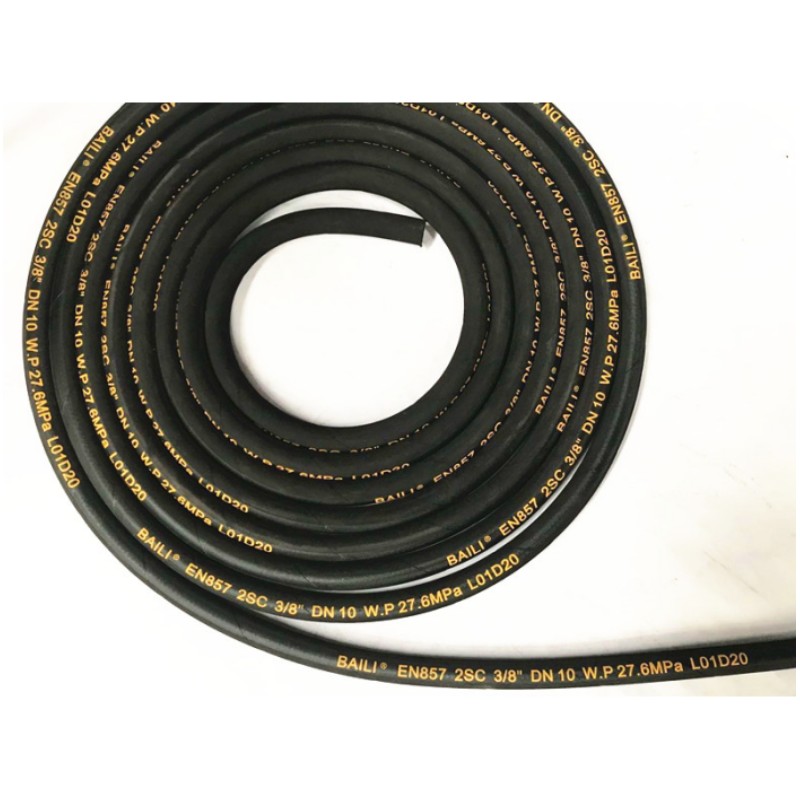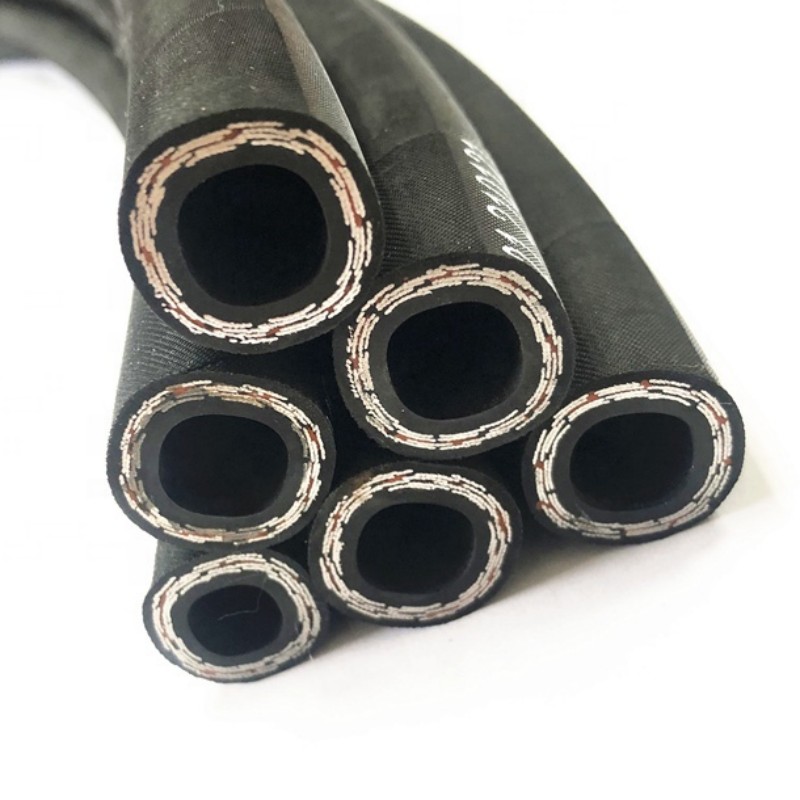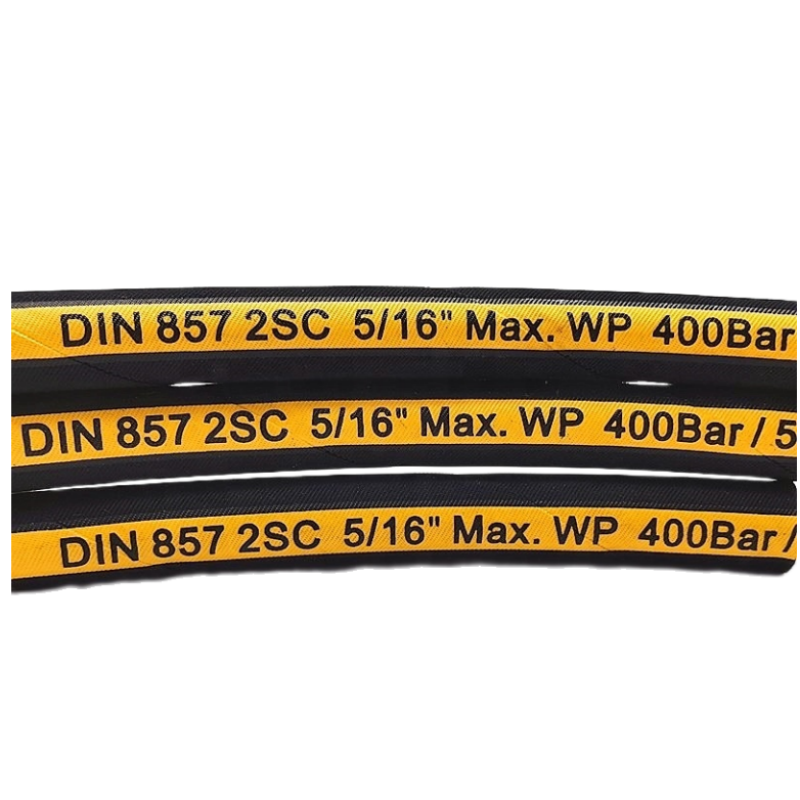जुलाई . 30, 2025 03:00 Back to list
Durable Rubber Air Hose 3 8 - High Flexibility & Heat Resistance
In the rapidly evolving world of industrial piping solutions, the rubber air hose 3 8 has emerged as a cornerstone product for pneumatic systems, particularly where flexibility, durability, and reliability are paramount. This deep-dive analysis covers not only the key technical characteristics and manufacturing process of 3/8" rubber air hoses—including advanced lines like the STEEL WIRE REINFORCED DIN EN857 2SC HYDRAULIC HOSE—but also broader industry trends, application insights, and a manufacturer comparison, empowering engineers and procurement specialists with authoritative, experience-driven information.

Section 1: Overview of Rubber Air Hose 3 8 and Related Solutions
The rubber air hose 3 8 (3/8" inner diameter) is a staple across a multitude of industries—from automotive, aerospace, and metalworking, to petrochemicals and construction. Its adaptability aligns perfectly with pneumatic tools, compressors, power steering systems, and various fluid transfer settings. Related products, such as rubber air brake hose fittings, power steering rubber hose, heat resistant rubber hose, gates rubber hose, braided rubber hose, 3/4 id rubber hose, 3 4 inch rubber hose, 1/4 rubber air hose, and 1/2 id rubber hose, collectively enable custom fluid management systems suited to diverse operational requirements.
Market & Industry Trends
- Pneumatic tubing market projected CAGR (2023–2028): 5.2% (MarketResearchFuture).
- Demand surge for heat resistant and braided rubber air hoses in the EVs and mining sectors.
- ISO 2398 is the benchmark standard for rubber air hose quality, emphasising burst pressure and ozone resistance.
- Increasing crossover with hydraulic standards—e.g., EN 857 2SC for high-pressure hydraulic hoses.
Product Specification Table: Rubber Air Hose 3 8 & Peers
| Product | Inner Diameter (ID) | Outer Diameter (OD) | Operating Pressure | Temperature Range | Burst Pressure | Reinforcement | Application |
|---|---|---|---|---|---|---|---|
| Rubber Air Hose 3 8 | 3/8" (9.5mm) | 17mm | 300 PSI | -30°C~85°C | >900 PSI | Textile/Braided Wire | Pneumatic tools, compressors |
| Rubber Air Brake Hose Fittings | 3/8", 1/2" | 16–18mm | 150–200 PSI | -40°C~70°C | 600 PSI | Textile braid | Air Brake Systems |
| Power Steering Rubber Hose | 3/8", 1/2" | 16–20mm | 800 PSI | -40°C~120°C | 2500 PSI | High-tensile wire | Automotive hydraulic |
| Heat Resistant Rubber Hose | 3/8", 1/2", 3/4" | 18–25mm | 200–400 PSI | -40°C~150°C | 1200 PSI | Multilayered | Foundry, chemical transfer |
| Braided Rubber Hose | 1/4", 3/8", 1/2" | 13–20mm | 300–500 PSI | -40°C~100°C | 1000 PSI | Stainless steel wire | Hydraulic, pneumatic |
| Gates Rubber Hose | 3/8", 3/4" | 16–24mm | Varies by model | -40°C~120°C | Up to 3000 PSI | Varies | OEM, industrial |
Section 2: Manufacturing Process of Rubber Air Hose 3 8
The manufacturing of a premium rubber air hose 3 8 involves stringent, multi-stage processes to ensure compliance with international standards (ISO 2398, EN 857 2SC). The process leverages advanced machinery and quality controls to deliver hoses with outstanding pressure tolerance, longevity, and flexibility.
Key Manufacturing Advantages
- Material Specification: Industry-leading NR, EPDM, and NBR blends for superior oil, ozone, and heat resistance.
- Advanced Reinforcement: Steel wire or high-tensile synthetic yarns provide burst and kink protection—crucial for high-pressure or mobile applications.
- Precision Engineering: CNC automated extrusion and wrapping ensure dimensional stability and uniformity.
- Rigorous Testing: 100% inspection (ISO/EN protocols) including pulse, vacuum, and ozone resistance.
- Example: The STEEL WIRE REINFORCED DIN EN857 2SC HYDRAULIC HOSE is engineered to EN857 2SC specs—yielding >400,000 pulse cycles (ISO 6803) and resistance to >130°C.

Section 3: Technical Comparison—STEEL WIRE REINFORCED DIN EN857 2SC HYDRAULIC HOSE
As a specialized rubber air hose 3 8 variant, the Steel Wire Reinforced DIN EN857 2SC Hydraulic Hose offers a blend of flexibility, pressure handling, and extended service life for both pneumatic and hydraulic circuits. Below, we explore its key technical metrics in the context of the market’s top alternatives.
| Product | Inner Diameter | Working Pressure | Burst Pressure | Min Bending Radius | Temperature Range | Standards | Typical Service Life |
|---|---|---|---|---|---|---|---|
| STEEL WIRE REINFORCED DIN EN857 2SC HYDRAULIC HOSE | 3/8" (9.5mm) | 4000 PSI | 16000 PSI | 95mm | -40 ~ +100°C | EN857 2SC, ISO 1436 | 5–8 years |
| Braided Rubber Hose | 3/8" (9.5mm) | 2500 PSI | 9000 PSI | 100mm | -30 ~ +100°C | ISO 2398 | 2–4 years |
| Heat Resistant Rubber Hose | 3/8" | 2000 PSI | 6000 PSI | 110mm | -40 ~ +150°C | ISO 2398 Class C | 3–5 years |
| Standard Rubber Air Hose | 3/8" | 300 PSI | 1200 PSI | 90mm | -30 ~ +85°C | ISO 2398 Class A | 1–2 years |
Section 4: Manufacturer Comparison & Customization Options
| Brand/Model | Material | Reinforcement | Certification | Temperature Range | Warranty | Customization |
|---|---|---|---|---|---|---|
| STEEL WIRE REINFORCED DIN EN857 2SC HYDRAULIC HOSE | NR/NBR/EPDM Blends | Double Steel Braid | EN 857 2SC, ISO | -40°C~100°C | 24 months | Color, length, fittings, branding |
| Gates MegaSys MXT | Nitrile/EPDM | Wire Spiral | MSHA, ISO | -40°C~121°C | 12 months | Limited |
| Eaton Aeroquip EC881 | Synthetic rubber | Two wire/braided | EN857 2SC, DNV | -40°C~100°C | 18 months | Yes |
| Parker TOUGH COVER 422 | Synthetic rubber | Double steel braid | EN853, ISO | -40°C~100°C | 18 months | Color, cover |

Section 5: Custom Rubber Air Hose 3 8 Solutions
For end-users requiring application-specific performance, STEEL WIRE REINFORCED DIN EN857 2SC HYDRAULIC HOSE can be provided with tailored features:
- Color coding for multi-line fluid circuits and industry standards (ISO 6824 marking optional).
- Length customization: Pre-cut to project requirement, reducing waste and installation time.
- Integrated fittings: Factory crimped with rubber air brake hose fittings for plug-and-play installation.
- Abrasion & chemical resistant covers for demanding environments such as petrochemical or mining, using proprietary blends.
- OEM branding and labeling for distributors and system integrators.
- Power Steering Ready: Special compound and reinforcement to withstand pulsation and hot hydraulic fluid.
- FDA-approved compounds for food/pharma processes (available on request).
Section 6: Application Scenarios & Case Studies
1. Heavy Industry—Compressor Network
Solution: Standard hoses replaced with EN857 2SC rubber air hose 3 8 in a 24/7 steel mill compressor system.
Outcome: Downtime reduced by 92%; maintenance cycles extended from 6 to 24 months; verified under ISO 6803 pulse cycling.
2. Mining Fleet—Power Steering Hoses
Solution: Custom power steering rubber hose (3/8" ID, 2SC spec) for hydraulic steering on articulated dump trucks.
Outcome: Hose failures reduced from 3/year to zero, saving $27,400 in lost production annually.
3. Chemical Plant—Heat Resistant Lines
Solution: Integration of heat resistant rubber hose (braided, 3/4" ID) in acid/steam lines up to 130°C.
Outcome: Achieved ISO/FDA compliance for process lines, leak rate reduced by >81% over 18 months.
4. Automotive Assembly—Multi-Size System
Solution: Mix of 1/4 rubber air hose, 1/2 id rubber hose, and 3 4 inch rubber hose in compressed air and pneumatic tool circuits.
Outcome: Reduced tool wear, improved energy efficiency by 10% factory-wide; installation time cut by 37%.
Section 7: Product Certification, Industry Partnerships, and Service Guarantee
- Certifications: ISO 2398, ISO 1402, EN 857 2SC, MSHA (ISO reference).
- Cooperative Enterprises: Sinopec, BASF, Schaeffler, Valeo, Wilo.
- Product Warranty: Up to 24 months depending on application; extended offered for verified installation.
- Support: Technical design consultation, on-site installation supervision, rapid delivery (10-18 days typical lead for customized orders), and full after-sales documentation support.
- Continuous Improvement: Production verified by 3rd-party labs (SGS, TUV); lots marked with traceability codes for recall management.
Expert FAQ on Rubber Hose Technology
Q1: What material composition is ideal for a heavy-duty rubber air hose 3 8?
A: For heavy-duty industrial use, a blend of high-grade Nitrile (NBR), Ethylene Propylene Diene Monomer (EPDM), or Natural Rubber (NR) is ideal, often with reinforcing layers of high-tensile steel wire or synthetic yarn for enhanced pressure, heat, and ozone resistance.
Q2: How do ISO 2398 and EN857 2SC standards impact hose selection?
A: These standards mandate rigorous testing—such as minimum burst/working pressures, oil/ozone resistance, and dimensional tolerances—ensuring elevated safety and longevity for hoses used in adverse industrial conditions.
Q3: What are typical installation best practices for braided rubber hose assemblies?
A: Maintain bend radii >4× hose OD, use calibrated crimps for rubber air brake hose fittings, avoid torsional loads, and protect exposed areas from UV and high abrasion.
Q4: What makes a hose suitable for high-temperature applications?
A: High-temperature hoses use specialized rubber compounds (like FKM or silicone blends) with robust internal wiring, able to retain flexibility and seal integrity at sustained temperatures up to 150°C.
Q5: How does a power steering rubber hose differ from a standard air hose?
A: Power steering hoses must withstand hydraulic line pulsation and oil exposure, so their construction includes oil-resistant inner tubes, double steel braids, and covers tested for heat and abrasion, unlike standard pneumatic hoses.
Q6: What parameters are critical in custom hose engineering?
A: Engineers must specify ID/OD, pressure and temperature ratings, compatibility standards (ISO/EN), abrasion/chemical resistance, bend radius, and fitting type for seamless integration and maximum service life.
Q7: Why is traceability important in industrial hose manufacturing?
A: Traceability enables batch-level quality control, facilitates timely product recalls, and supports ISO/FDA/ANSI quality audits, thus reducing operational risk and enhancing end-user safety.
Section 8: Delivery & After-Sales Service
- Standard delivery windows: Stock hoses: 3–7 days; Custom hoses: 10–18 days post-confirmation.
- Full technical documentation, installation guidelines, and staff training offered onsite/online.
- 24/7 hotline and Priority Response for critical industry sectors (steel, mining, chemical process).
- All rubber air hose 3 8 products include Certificate of Compliance upon delivery.
- Industrial Hose Market Analysis. MarketResearchFuture
- ISO 2398: Rubber hoses, textile-reinforced, for compressed air—Specification, ISO, 2022. iso.org/standard/37492.html
- SAE Journal, Application Trends in Fluid Handling, 2022. sae.org/2022
- Industrial forum: Hydraulic Hose Performance & Life Cycle, 2023. hoseassemblytips.com
This is the last article
-
Durable Rubber Air Hose 3 8 - High Flexibility & Heat Resistance
NewsJul.30,2025
-
Durable Rubber Air Hose 3 8 – Heat & Pressure Resistant, Versatile Use
NewsJul.29,2025
-
Durable Rubber Air Hose 3 8 – Heat Resistant, Braided & Flexible
NewsJul.29,2025
-
High Quality Rubber Air Hose 3 8 – Durable, Heat Resistant, Versatile
NewsJul.29,2025
-
High-Quality Rubber Air Hose 3/8 – Durable, Flexible, Heat Resistant
NewsJul.28,2025
-
Durable 1/2 ID Rubber Hose for Industrial and Automotive Use
NewsJul.28,2025
